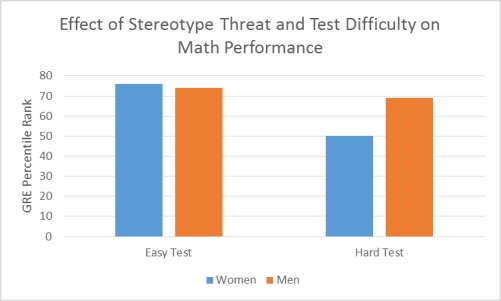Use the following to answer questions
Scenario III
Scenario III is based on fabricated data inspired by the following study:
Spencer, S. J., Steele, C. M. & Quinn, D. M. (1999) . Stereotype threat and women's math performance. Journal of Experimental Social Psychology, 35, 4-28.
Effect of Stereotype Threat on Math Study
The myth that men outperform women in math is widely believed by many individuals. The purpose of the study described in Scenario III was to determine if a sample of women whose math abilities equaled a sample of men would fall victim to this threat. To that end, 28 adult men and 28 adult women were administered an easy math test or a difficult math test. The performance of men and women on both the easy and hard test was quantified. A two-factor ANOVA revealed a significant main effect for test, with participants scoring significantly better on the easy test. The analyses also revealed a main effect for sex, with men performing significantly better than women. The interaction between test difficulty and sex was also statistically significant. Further inspection of the data revealed that although men and women did not differ on the easy math test, women performed significantly less well than men on the difficult math test. Given that the screening criteria for participants including earning a grade of B or better in college calculus, and scoring in at least the 85th percentile on the math subsection of the ACT, the current study indicates that women do succumb to math stereotype threat but only when the math challenge is great. The data are presented in Figure 2.
 Figure 2. Although women and men performed equally on an easy version of the math test, women performed significantly worse than men on the difficult version.
Figure 2. Although women and men performed equally on an easy version of the math test, women performed significantly worse than men on the difficult version.
-(Scenario III) The study described in Scenario III examined the effect of two independent variables on math performance. Based on this design, which of the following is true?
Definitions:
Onlooker Play
A stage of child play where the child observes others playing but does not join in, often seen as a critical stage in social development.
Observing
The act of carefully watching and noting phenomena as they occur in order to gather information or come to a conclusion.
Mimicking
The act of imitating someone's actions, speech, or mannerisms, often to enhance social bonding or learning.
Rule Violations
Acts that go against set guidelines or laws, which can range from social norms to legal boundaries.
Q22: What is the nickname for many pro-anorexia
Q26: A(n) _ assesses the general program operation,
Q30: Fix It<br>At the end of each month
Q31: Identify an advantage to a patient who
Q53: In within-subjects designs _ participants are measured
Q93: Dr. Whitt has completed several steps in
Q113: Akita is interested in conducting a study
Q139: According to the research approximately _ young
Q145: Describe a research study that would benefit
Q160: (Scenario II) Which of the following is